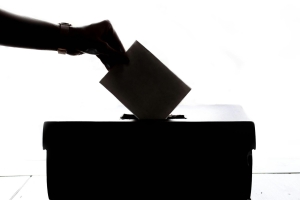PDRI/MLP/USAID-DRG Policy Brief 1: Elections as Windows of Opportunity? Civic Space in Democratic and Backsliding Regimes
This policy brief was prepared by Mateo Villamizar-Chaparro of Universidad Católica de Uruguay and Erik Wibbels of the University of Pennsylvania. It is part of a series released by PDRI in collaboration with the Machine Learning for Peace (MLP) project.
Key Takeaways:
- Elections are crucial in shaping democratic ideals and balancing power, but they can also be exploited by aspiring autocrats to undermine civic space and consolidate power. This brief examines how backsliding regimes treat civic space differently from liberal democracies, particularly around elections.
- Backsliding regimes exhibit higher levels of censorship and other forms of repression in the months leading up to elections compared to democracies. This suggests a strategic effort to control the information environment before elections.
- There are fewer significant differences in civic space actions between backsliding regimes and democracies during election months, indicating that backsliders may aim to appear more democratic to enhance legitimacy.
- Civic space activity generally returns to pre-election levels after elections in both regime types, with fewer protests observed in the months following elections, especially in more competitive backsliding regimes.
Introduction:
Elections are fundamental to democratic governance, providing legitimacy and a means to balance power among societal groups. However, for aspiring autocrats, these events can serve as opportunities to erode civic space, weaken opposition, and solidify their hold on power. This brief explores how backsliding regimes—those that have shifted from more democratic to less democratic forms—differ from their liberal democratic counterparts in managing civic space around elections. By analyzing high-frequency data from the Machine Learning for Peace (MLP) project, the study offer new insights into how backsliding regimes differ from liberal democracies in their management of civic space during election periods.
The Challenge
The report addresses a critical gap in the study of democratic backsliding by focusing on the pivotal role of elections in this process. While extensive research has examined the gradual structural factors contributing to backsliding, less attention has been given to the specific tactics employed by backsliders immediately before, during, and after elections. This report fills an important empirical and analytical gap by using high-frequency data to study the short-term dynamics of democratic backsliding during these crucial periods and capturing the strategic behaviors that underpin longer-term trends
Questions and Approach
This report investigates three main questions:
- How do backsliding regimes’ treatments of civic space during non-electoral periods compare to those of liberal democracies?
- How do these treatments differ during electoral periods?
- Do backsliding regimes with narrower electoral victories behave differently from those with larger margins?
The researchers analyze seven types of civic space events—censorship, arrests, lethal violence, non-lethal violence, protests, legal actions, and legal changes—using news articles to capture monthly dynamics. The ‘electoral periods’ are defined as six months before, one month during, and six months after elections.
Distinguishing Regime Types
Regimes are categorized using the V-DEM project’s Regimes of the World (RoW) variable into four types: liberal democracies, electoral democracies, electoral autocracies, and closed autocracies. A regime is classified as backsliding if it shifts from a more democratic to a less democratic type.
Finding 1: Non-Electoral Periods
Backsliding regimes demonstrate higher levels of censorship and more arrests during non-electoral periods compared to democracies. This trend intensifies during election periods, with backsliders also exhibiting more election irregularities. These findings highlight a pattern of increased repression and manipulation outside of election cycles.
Finding 2: Electoral Periods
- Pre-Electoral Months: Backsliding regimes show significantly more censorship (57% increase) and more reports of election irregularities (44% increase) before elections. These regimes also engage in more electoral activities, reflecting their efforts to control the narrative before elections.
- Month of Elections: Both regime types experience an increase in election-related events during election months, but backsliding regimes are similar to democracies in their overall treatment of civic space during this time.
- Post-Elections: Both backsliding regimes and democracies see a reduction in protests post-elections. However, the level of reduction is similar across regime types, suggesting a return to typical civic space activity after elections.
Finding 3: Electoral Vulnerability and Backsliding Regimes
Electorally weaker backsliding regimes (those with smaller win margins) show distinct behaviors, including fewer legal actions and protests compared to their stronger counterparts. These regimes also exhibit different patterns of violence and censorship during electoral periods, indicating strategic adjustments based on their electoral vulnerability.
Policy Implications
The key findings suggest that backsliding regimes often focus their attacks on civic space during non-electoral periods, avoiding overt repression during elections to avoid international scrutiny. Policymakers should monitor civic space closely between elections, particularly for signs of increased censorship and arrests. Strengthening legal protections for civil society and independent media can help counteract these trends. Additionally, improving judicial independence could limit the use of legal systems to suppress opposition.
Acknowledgment
This policy brief was supported by the Machine Learning for Peace (MLP) project, which provided high-frequency data and analytical tools essential for this study. The authors wish to acknowledge the contributions of the research teams and partners involved.
References
S. Haggard and R. Kaufman. Backsliding: Democratic Regress in the Contemporary World. Cambridge
University Press, 2021.
A. Healy and G. S. Lenz. Substituting the end for the whole: Why voters respond primarily to the election-year economy. American Journal of Political Science, 58(1):31–47, 2014.
G. A. Huber, S. J. Hill, and G. S. Lenz. Sources of bias in retrospective decision making: Experimental evidence on voters’ limitations in controlling incumbents. American Political Science Review, 106(4):720–741, 2012.
A. Lührmann, S. I. Lindberg, and M. Tannenberg. Regimes in the world (riw): A robust regime type measure based on v-dem. V-Dem Working Paper, 47, 2017.
M. Svolik. When polarization trumps civic virtue: Partisan conflict and the subversion of democracy by incumbents. Quarterly Journal of Political Science, (15):3–31, 2020.


